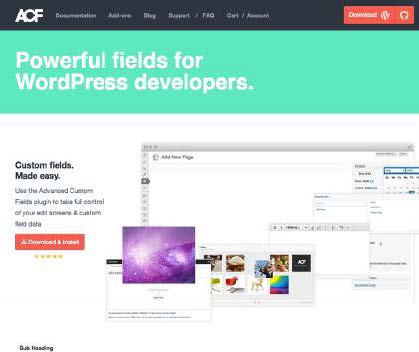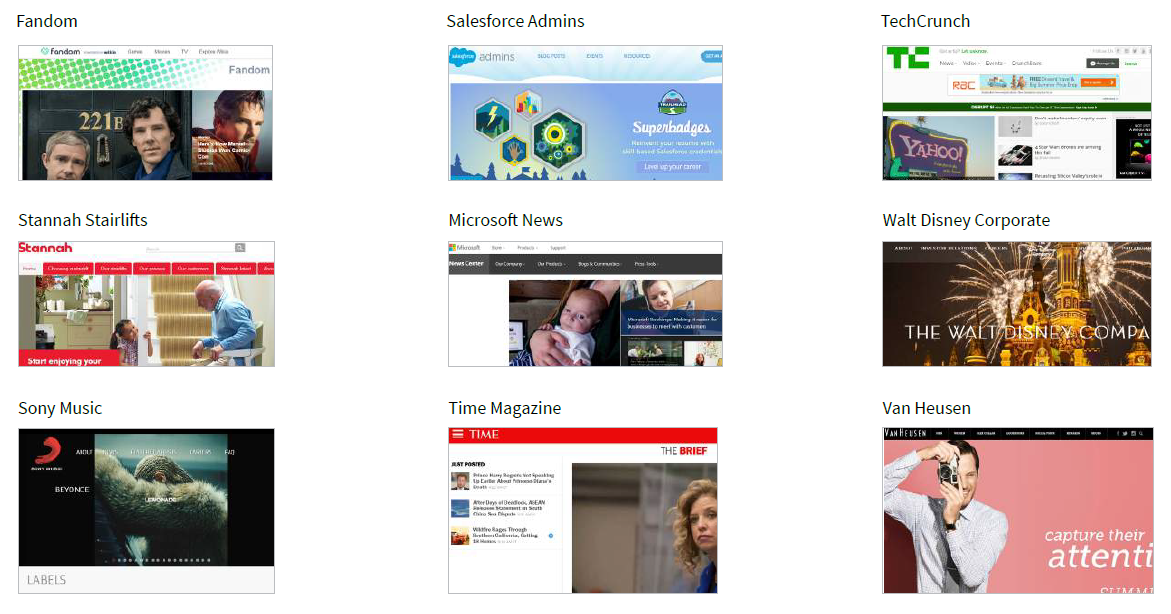Make an informed decision on your next CMS
Contents
MYTH #1 – WordPress is just a blog platform
MYTH #2 – WordPress isn’t secure
MYTH #3 – WordPress can’t integrate with…
MYTH #4 – WordPress isn’t scalable – it can’t do big sites
MYTH #5 – WordPress can’t do ecommerce

To succeed in the modern digital marketplace, you need to be equipped with the right tools for your business.
Your website is perhaps the most important tool of all.
That’s why it’s vital that any decisions you make about your website are based on facts – rather than pre or misconceptions.
In this guide we’ll look at some of the most common myths and misunderstandings we hear about WordPress and examine the truth of where they come from, as well as why WordPress is now more powerful than you might think…
It’s about the right solution for you
This guide isn’t about telling you WordPress is the right platform for you. That’s a decision that should be based on your needs – it’s very possible WordPress isn’t what you need.
However, any decision about the build of your website needs to come from an informed position – that’s why it’s important to confront commonly held myths and misconceptions.
The top 5 most popular CMS platforms
- WordPress
- Joomla
- Drupal
- Magento
- Blogger


It’s certainly true that WordPress started out as a blogging platform. And yes, you can still create a blog on WordPress.
However, just because that’s all WordPress could do when it launched in 2003 doesn’t mean that’s all it can do now.
Did you know?
All WordPress themes and plugins now support language packs. You can find community-based translations at translate.WordPress.org
Expand to meet your needs
WordPress is as simple as it can be on first install.
This lowers the barrier to entry, but might mean you don’t immediately see the functionality you’re after.
However, advanced functionality does exist. Plenty more on this to come!

It’s all about plugins
You can expand WordPress to suit your requirements thanks to its huge library of plugins – or develop custom plugins to do what you need.
“A good developer can write a plugin for anything you are likely to need.” SALLY KNIGHT, DEVELOPER AT ELIXIRR DIGITAL
Standout plugin
The Advanced Custom Fields Plugin opens WordPress up to being much more like a traditional CMS.


Did you know?
WP.org reports 45,620 currently available plugins, with a total of 1,333,471,262 downloads at time of writing!


Many of the WordPress security horror stories you hear come from when the software was in its infancy in 2003. Again, WordPress has evolved since then.
You do hear more stories about WordPress being under threat. The reason for this is simple – WordPress is popular.
While this makes it an appealing target for hackers and crackers, it also means there is an extensive community of developers on your side – ensuring there are plenty of people working to fix any holes in your security.


Security that’s always evolving
Since its inception, WordPress has had 173 releases and 4 major version updates, all of which included improving the security of the codebase.
Keeping up to date keeps you safe
In a survey of 8,500 hacked WordPress websites, 56% were running an outdated version of the WP core and a further 25% were exposed due to outdated versions of 3 commonly used plugins.
If the site is frequently updated, it’s as secure as any CMS on the market.
“Nearly 75 percent of all legitimate websites have unpatched vulnerabilities” – SYMANTEC 2016 INTERNET SECURITY THREAT REPORT
Standout plugin
iThemes Security makes life much harder for an attacker – this plugin doesn’t just secure the site, but also monitors it and gives you updates on any suspicious activity.



The truth is that integration can be a headache for developers.
From a clientside perspective, integration is extremely important – this puts even more focus on this issue.
If all your business data is stored in a system like Microsoft Dynamics or your sales strategy is based off a platform like Salesforce, then it’s understandable that integrating with this software will be a major concern.
However, is there any reason that WordPress is a particular integration problem? We don’t think so.
“Difficulties with integration usually come from issues at the API end. As long as a service has a well-documented and stable API then we can integrate with anything.” – GARY RAE, WEB DEVELOPER AT ELIXIRR DIGITAL

A two-sided problem
While a developer may struggle with integration, there’s no reason to believe this is more likely if you are using WordPress rather than another platform.
Ultimately, integration issues are most often caused by the unique requirements of the software – rather than the website.
Thanks to the flexibility of WordPress, a skilled developer should be able to find a way to achieve the integration you’re looking for.
Plugins and Integration
Each service you want to integrate with will have a separate plugin – either from WP.org or custom built by your developer.
Integration Success Stories
- The Thatchers Cider online store (more on that later…) integrates seamlessly with WorldPay
- The Cosmetic Insurance training page uses a bespoke API on a windows server to pull in training courses
- We’ve successfully integrated Real Ex Payments into the Gluten Free Meals online store
- On the Beating Bowel Cancer online store, we successfully integrated with SagePay


Much of this comes back to an earlier misconception – that WordPress is somehow incapable of doing anything more than running a blog.
This creates other negative expectations, such as:
- A WordPress site can’t handle high volumes of traffic
- A WordPress site will look unprofessional
- A WordPress site becomes unmanageable if it gets big
Having developed WordPress sites for many clients, creating websites to fit a variety of needs and audience sizes, we have many examples that disprove these presumptions.
Did you know?
The former head of Google’s web spam team, Matt Cutts, has gone on record to say that sites built using WordPress are capable of ranking higher in Google’s search results because the CMS itself takes care of 80-90% of Google’s crawling issues.

The new Gay Times website was developed on WordPress
At its peak, the Gay Times website comfortably handles 100,000 users per day and serves on average 1.1 million page views per month.
“The WordPress interface, combined with Elixirr Digital’s superb plugins, create a wonderfully userfriendly system for seasoned journalists and new contributors alike.” – EDITOR, GAY TIMES
Standout Results
- 363% increase in visits in the first year
- 35% increase on dwell 281% 245% time on the site
- Mobile sessions up by 281%
- 245% increase in page views

Gay Times is a WordPress site we’re proud of here at Elixirr Digital – but it’s not the only big WordPress site out there…



The presumption that WordPress is just a blogging platform is at the core of many of the concerns people have about what it can do.
After all, if you believe that WordPress can’t handle being your site’s CMS, you’re hardly likely to trust it with your online store.
There’s another misconception here – that WordPress isn’t specialist enough, or that it lacks the specific functionality required to tackle the challenges of ecommerce.
Ultimately, WordPress is a flexible solution. You can turn it into whatever you need.
We believe that concerns about WordPress and ecommerce ignore the wealth of plugins available to WordPress developers.

WooCommerce gives WordPress powerful ecommerce functionality
WooCommerce, the most popular WordPress ecommerce plugin, was acquired by Automattic (WordPress’ parent company) in a reported $30m deal.
To date it’s had more than 15 million downloads, and powers over 37% of all online shops. Comparatively Magento has a 6% marketshare.
Standout plugin
WooCommerce has become the most popular ecommerce platform available online.

Ecommerce in the UK
- 77% of UK internet users made a purchase online in 2015
- British ecommerce is expected to grow by 10.5% this year
- Mobile accounts for 51% of UK ecommerce
ALEF on WooCommerce
ALEF Bookstore, a London-based bookstore with an inventory of over 34,000 products, uses WooCommerce for its online shop.


When we created the new Thatchers website, we used the WooCommerce plugin for their online store.
The new site offered a greatly improved user experience for visitors to the store, as well as advanced analytics ecommerce tracking out of the box.

Our developers were also able to use WooCommerce to create a ‘mix and match’ function within the store – allowing customers to build a custom selection of ciders.


WordPress could be just the ticket, but equally your needs might require a different solution
Here at Elixirr Digital we’re platform agnostic – we don’t think there is a single ‘best’ CMS.
Our decision making processes are driven by data and user insight. That’s why we believe it’s important to get past myths and misconceptions, so that you can make an informed decision about what’s best for you.
Your requirements are the key
Whenever we start a web development project, the first step is working out the requirements – who is the website for, what does it need to do, how can we achieve its business objectives.
Come meet with our experts and let’s talk about what you need from your website – who your audience is, what it needs to do for your business, and more.
Then let’s make an informed decision – is WordPress the best platform for your site, or is something else going to do a better job for you?
Download the guide










